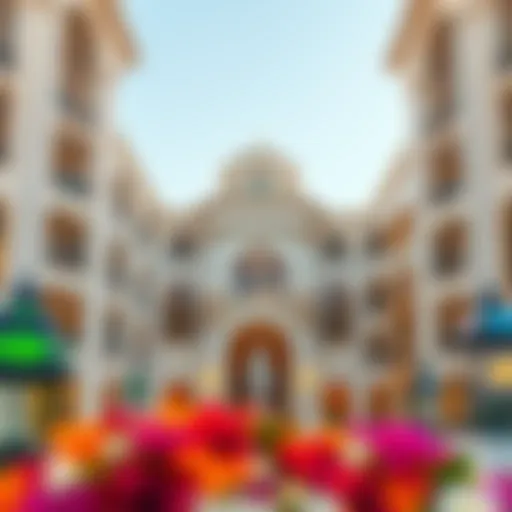Exploring the Deira Partition Room: Insights and Implications


Intro
Deira, an iconic district nestled in Dubai, holds a treasure trove of history and a vibrant mix of cultures. It’s a place where the old and the new intertwine, making it a dynamic area for residents and investors alike. In this landscape, partition rooms have emerged as a notable feature, representing a unique solution to the evolving demands of urban living.
These partition rooms, often originated from larger apartments, have been adapted to suit a diverse population. They serve as a practical living arrangement for a multitude of residents, ranging from expatriates seeking affordable housing to professionals navigating Dubai's expensive rental market. As such, understanding the intricacies of partition rooms can offer valuable insights into the broader real estate dynamics of Deira, paving the way for informed decisions by homebuyers and investors.
Embarking on this exploration, we will dissect the current market trends, delve into historical patterns, and provide an overview of property listings available in this bustling locale. This will not only unveil the advantages of partition rooms but will also highlight their implications for lifestyle choices, investment potential, and urban development in Deira.
Prelude to Deira
Deira is more than just a district in Dubai; it’s a vibrant tapestry woven from rich history, geographical distinctiveness, and cultural diversity. This part of the city is bustling with movement, from the crowded souks to the expansive waterfront. Understanding Deira is crucial for anyone looking to explore partition rooms, as it reflects the unique socio-economic landscape in which these living arrangements exist.
The partition rooms have evolved to address housing needs in a city that stands at the crossroads of tradition and modernity. For investors, realtors, and developers, grasping Deira's essence can influence decision-making profoundly. It’s not about simply counting the bricks; it’s about recognizing the heartbeat of the community.
Geographical Overview
Nestled along the shores of Dubai Creek, Deira is characterized by a series of bustling streets and historic landmarks. This district stands as one of the oldest parts of Dubai, showcasing a blend of old-world charm and modern infrastructural development. The availability of various facilities, from traditional markets to advanced transportation systems, makes it a hub for both locals and expatriates.
The creek itself acts as a lifeline, providing not just stunning views but also facilitating trade and transport. Notably, the district’s proximity to Dubai International Airport enhances its appeal, making it easily accessible and a preferred location for several demographics. Those interested in partition rooms will appreciate this interconnectedness, as it brings together a diverse array of residents who share space yet uphold distinctive lifestyles.
Historical Significance
Deira has carved a distinct place in Dubai’s historical narrative. Originally a modest fishing village, its growth is a testament to the rapid development that transformed Dubai into a global city. This evolution reflects on the real estate landscape, with partition rooms finding their niche as a flexible living option, particularly during periods of economic fluctuations.
Historically, Deira served as a center for commerce and trade, heavily influenced by its strategic location near the creek. As traders from various cultures arrived, the district became a melting pot of influences, leading to the creation of unique architectural styles and living arrangements. The partition rooms, a relatively modern development, echo this historical embrace of diversity, allowing individuals from different backgrounds to coexist and share resources, fostering community bonds.
Cultural Diversity
Perhaps the most striking feature of Deira is its cultural kaleidoscope. The district boasts a significant population of expatriates from around the globe, contributing to an eclectic mix of languages, cuisines, and customs. This diversity is not merely a backdrop; it shapes living experiences profoundly.
Partition rooms embody the spirit of communal living that resonates well with this multicultural environment. For many residents, these spaces are not simply places to sleep, but hubs of social interaction and cultural exchange. The sense of community among those sharing rooms often leads to lasting friendships while providing a sense of belonging amidst the fast-paced life of the city.
"Living in Deira offers a learning experience like no other; it’s where the old meets the new, and cultures collide beautifully."
With its rich tapestry of history, geography, and cultural diversity, Deira presents a unique backdrop for understanding partition rooms and their implications. Recognizing these layers offers valuable insights for potential buyers, investors, and developers navigating the intricate property landscape.
Understanding Partition Rooms
Understanding partition rooms within the context of Deira is essential for grasping the real estate landscape in this bustling enclave of Dubai. Partition rooms are a unique living arrangement that cater primarily to a diverse and multi-cultural population. They serve as an intermediate option for those who may find traditional rentals either too costly or inconvenient. This arrangement not only addresses housing shortages but also provides a more social and community-oriented living experience, which is increasingly sought after in urban settings.
Definition and Context
Partition rooms essentially refer to shared accommodations where a larger space is divided into smaller, private units. Typically, these arrangements include shared living amenities, such as kitchens and bathrooms, which enhances the overall sense of community and interaction among residents. The significance of this arrangement in Deira cannot be overstated. With its population comprising various nationalities and professions, partition rooms have emerged as a critical solution to the housing crisis while allowing residents to forge connections.
Design and Layout
The design of partition rooms often reflects both functionality and efficiency. Many setups are straightforward, featuring basic amenities that keep costs manageable. Standard partition suites might have simple furnishings while maximizing the use of space to accommodate the necessary living arrangements. The layout usually encourages interaction among tenants, which can be particularly beneficial for those new to the city or looking to expand their social circles. The importance of design encompasses both personal comfort and maximizing utility, which are paramount in the context of urban living.
Types of Partition Rooms
Standard Partition Suites
Standard partition suites exemplify a basic but highly effective form of housing in Deira. What sets them apart is their economical nature. They are often more affordable than standard apartment rentals, allowing individuals, particularly laborers or students, to find refuge in a competitive real estate market. A key characteristic is their practical design, often featuring essential furnishings and shared living spaces.
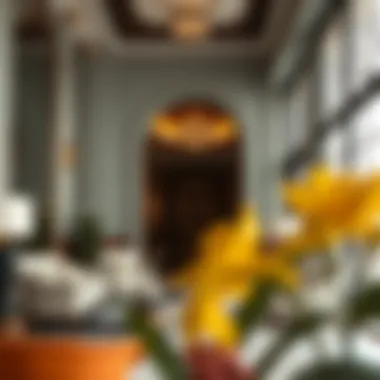
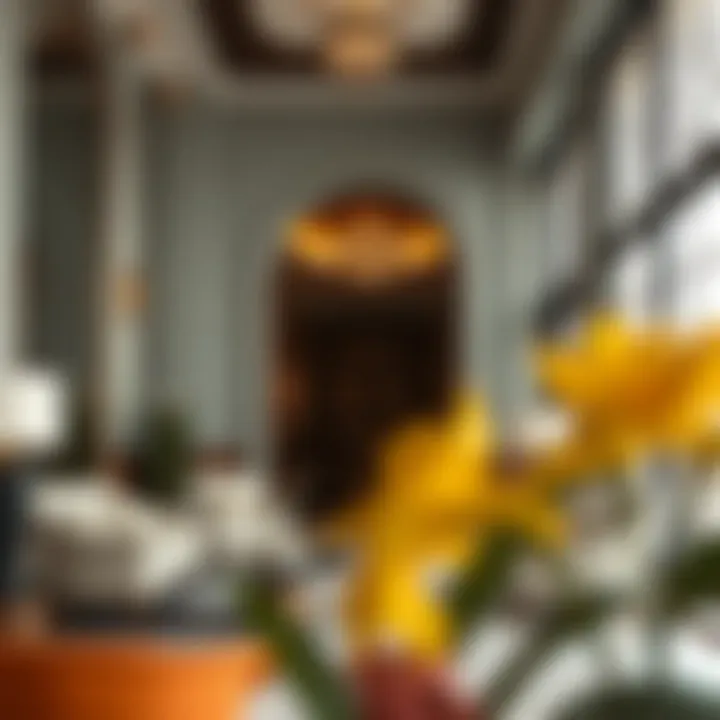
However, the trade-off often lies in the lack of privacy. Residents may feel the squeeze of close quarters, but the financial savings can outweigh this drawback for many.
Shared Living Spaces
Shared living spaces represent a different take on communal living. They frequently aim to create an environment where diverse individuals can coexist harmoniously. Common areas are usually well-furnished to promote social interaction, and this aspect alone can make shared living spaces attractive to a younger demographic or those who thrive in communal settings.
The beauty of these spaces lies in their ability to foster cross-cultural interactions. Nevertheless, conflicts can sometimes arise due to lifestyle differences, requiring strong communication skills among tenants.
Luxury Partition Choices
On the opposite spectrum, luxury partition choices cater to those desiring a higher level of comfort and privacy while still enjoying the benefits of shared facilities. These cleverly designed units typically offer upscale finishes, larger personal spaces, and exclusive amenities. This type of accommodation allows residents to experience a taste of luxury while still benefiting from the economical aspects of shared living.
Of course, higher costs accompany these units, which might limit their accessibility primarily to professionals or expats with lucrative employment. In this case, the question becomes whether one can justify the expense in the context of the overall market conditions.
Understanding these variations in partition rooms equips potential residents, investors, and analysts to navigate the complexities of Deira's housing options more effectively. It is not just about a roof over one’s head; it’s about finding the right fit within a vibrant community that reflects a world of diversity.
Market Dynamics in Deira
Understanding the market dynamics in Deira is critical for anyone looking to navigate the realm of partition rooms. Not only does this district represent a confluence of cultures and traditions, but it also offers unique real estate opportunities that have piqued the interest of investors and homebuyers alike. Grasping the underlying factors of demand and supply, pricing trends, and investment potential within this vibrantly diverse neighborhood provides a roadmap that can lead to insightful decisions.
Demand and Supply Factors
The demand for partition rooms in Deira is influenced by several interconnected factors. A significant driver is the district's strategic location. With its proximity to Dubai’s central business district and major transportation hubs, it attracts individuals from various backgrounds, including expatriates and young professionals who often seek affordable housing options.
In addition, Deira's appeal includes rich cultural experiences and accessibility to conveniences such as shopping malls, schools, and hospitals. This contributes positively to housing demand, as people seek neighborhoods that offer both a vibrant lifestyle and practicality.
- Cultural Multiplicity: The mix of traditions creates a welcoming environment for diverse residents.
- Economic Activity: Job opportunities in the surrounding areas draw individuals seeking housing while contributing to the local economy.
- Transport Links: Well-connected public transport reduces commuting time, enhancing the residential appeal.
On the flip side, the supply of partition rooms has to keep pace with the rising demand. The relatively compact area means that available real estate can sometimes fall short of buyer desires, leading to potential scalability challenges for developers.
Pricing Trends
Price trends in the partition room market of Deira can tell a compelling story about the local economy and consumer behavior. Over the past few years, prices have exhibited a noticeable upward trajectory, driven largely by the influx of residents and the limited availability of existing units.
- Comparative Analysis: Compared to other districts in Dubai, Deira offers competitive pricing, yet it also reflects qualities that justify its standing in the market. Units that boast amenities or prime locations tend to see higher price points.
- Market Fluctuations: Seasonal differences can affect pricing; for instance, housing costs may spike around the new school year when families are eager to secure their residence.
"The rapid changes in demand often leave sellers with a golden opportunity, but buyer awareness of market conditions can drive home valuable negotiating strategies."
Understanding these trends can equip investors with a clearer picture of the market, enabling them to make decisions that align with potential monetary returns.
Investment Potential
Investment in partition rooms within Deira presents a robust opportunity. As more individuals look for cost-effective living arrangements, the potential for profitability becomes increasingly attractive. Whether one is a seasoned investor or a first-time buyer, recognizing how partition rooms can generate consistent rental income can shift the perception of property value.
- Rental Demand: Given the area's popularity and efficient access to transport, rental units see substantial interest. This can lead to a steady cash flow, making properties in Deira highly regarded among income-generating investments.
- Future Developments: As Dubai continues to expand with planned infrastructural projects, understanding how these developments can influence property appreciation is paramount. Enhanced access, for example, will invariably have a positive effect on property values.
In essence, deconstructing the market dynamics in Deira unveils an intricate web of opportunities and challenges. Investors who take the time to analyze these factors could position themselves advantageously, carving out a niche in a thriving, dynamic landscape.
Living in a Partition Room
Living in a partition room is becoming an increasingly popular option in Deira, particularly for those navigating the bustling urban landscape of Dubai. This flexible housing solution caters to a broad spectrum of individuals, from expatriates seeking temporary accommodations to young professionals establishing their roots in the city. Understanding the dynamics of this living arrangement is crucial for various stakeholders in the real estate market.
Lifestyle Considerations
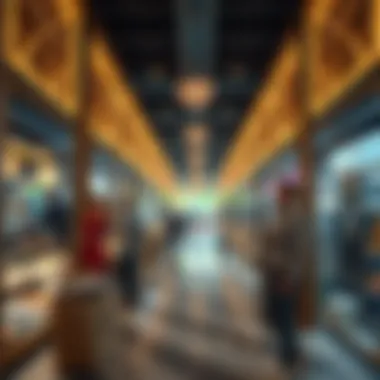
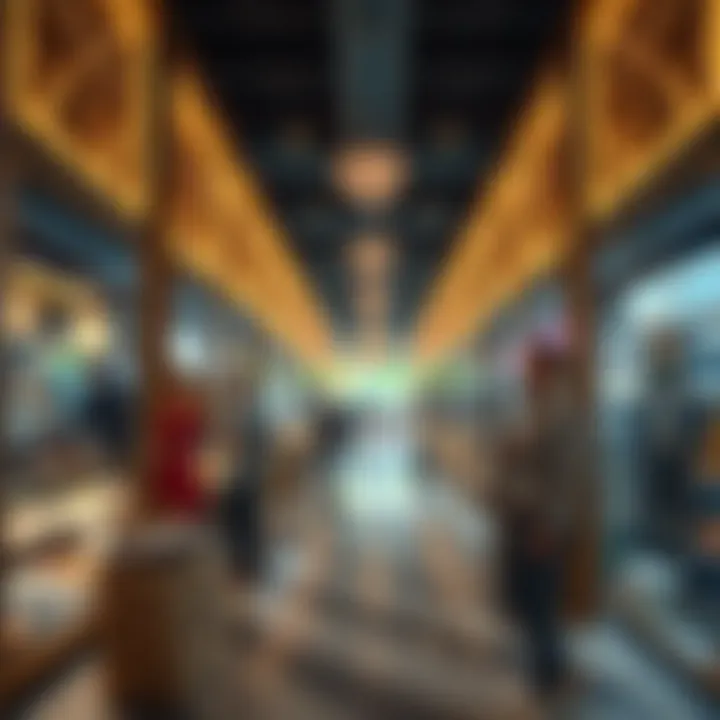
Choosing a partition room brings along its own set of lifestyle considerations. The first aspect to note is affordability. In a city where rent prices can give anyone a case of sticker shock, partition rooms often provide a more budget-friendly alternative. This cost-effectiveness can enable residents to allocate finances toward other necessities or even leisure activities.
Another vital element is ease of maintenance. Many partition rooms come fully furnished and equipped with essential facilities, easing the burden of moving and maintenance on the occupants. This can lead to a significant reduction in daily hassles, especially for those new to the city. Moreover, the compact nature of these rooms encourages residents to live with less clutter, which can foster a simple and minimalistic lifestyle.
However, it’s essential to consider the spatial constraints. Partition rooms may not offer the luxury of spacious living, and for some individuals, feeling cramped can impact their overall well-being. Managing personal space while living with roommates means learning to navigate shared responsibilities and establishing boundaries.
Community and Social Aspects
The social dynamics in partition rooms are equally compelling. Residents often find themselves in a melting pot of cultures, with each occupant bringing unique backgrounds and experiences. This diversity can lead to enriching communal living experiences, fostering friendships and networking opportunities.
In many cases, social interactions are not merely encouraged; they are a cornerstone of the living experience. Common areas in partition homes can facilitate a sense of community, enabling residents to unwind or share meals together. It's almost natural to form bonds over shared cooking sessions or movie nights, turning strangers into friends.
Moreover, this communal approach allows individuals from different walks of life to exchange ideas, cultures, and lifestyles. Living in such an environment can significantly help newcomers adjust to life in Dubai, as they may find companionship and a sense of belonging.
Challenges Faced by Residents
While partition rooms undoubtedly provide benefits, they are not without challenges. One prominent issue is the lack of privacy. With walls separating living spaces rather than doors, personal moments can often feel exposed. Such situations can lead to discomfort if not properly managed among residents.
Furthermore, there are the challenges of noise levels. The shared nature of partition living means that residents may have to deal with noise from both inside and outside the home. From late-night conversations to early-morning routines, the sounds can be a source of annoyance. Finding quiet moments becomes an essential part of daily life.
Another critical challenge is the potential for miscommunication. With shared responsibilities, conflicts may arise over cleaning duties or usage of communal items. Clear communication is essential to navigate these situations, but unfortunately, that doesn’t always happen naturally.
In summary, while partition rooms in Deira offer an innovative and affordable way to live in a cosmopolitan city, potential residents must weigh the benefits against the challenges. A thoughtful approach to lifestyle, community engagement, and conflict resolution can ensure a rewarding living experience that meets the dynamic needs of urban dwellers.
Legal Aspects of Partition Rooms
Navigating the legal landscape surrounding partition rooms in Deira is not only important for the residents but hangs crucial for landlords and investors as well. Understanding the legal foundations that govern these arrangements helps all parties protect their rights and interests. From local regulations to tenancy laws, each aspect plays a significant role in this multifaceted living arrangement. This section aims to shed light on some specific elements and benefits concerning the legalities of partition rooms.
Regulatory Framework
The regulatory framework governing partition rooms in Deira is mainly determined by the Dubai Land Department alongside relevant municipal regulations. Understanding these rules is vital as they dictate the legality and structure of partitioning practices. The Dubai Rental Laws, for instance, outline how partition rooms must be organized, ensure safety standards, and affect rental rates.
Typically, a property must comply with zoning laws and safety codes. A common pitfall for landlords is failing to register these partition areas with the appropriate authorities. Not adhering to official zoning regulations can lead to significant penalties. It's advisable for investors to seek legal counsel to ensure their properties meet all necessary requirements.
Moreover, the regulatory framework is dynamic, capable of shifting with new property developments and urban planning initiatives. Therefore, staying informed will aid potential stakeholders when evaluating their investment options.
Tenant Rights and Responsibilities
Understanding tenant rights and responsibilities is an integral part of renting a partition room. In Dubai, tenants have the right to reside in a safe and habitable environment. These rights are protected under the Rental Law, which stipulates what constitutes a livable space and the obligations landlords have toward their tenants.
Some core rights include:
- Right to privacy: Tenants have the right to enjoy their rented space without unwarranted intrusion.
- Maintenance obligations: Landlords must ensure that the room is in good repair and meets safety regulations.
On the flip side, tenants also have specific responsibilities that they should not overlook:
- Timely payment of rent: Failing to settle rental dues can lead to eviction.
- Adherence to property rules: If a building has designated regulations, such as noise control or guest policies, the tenant is obligated to follow them.
By understanding these facets, both parties can engage in a more harmonious rental arrangement, minimizing potential disputes.
Landlord Obligations
Landlords have a set of obligations they must fulfill to maintain a legal and ethical tenancy operation. In Deira, these responsibilities extend beyond just collecting rent. The fundamental landlord obligations include:
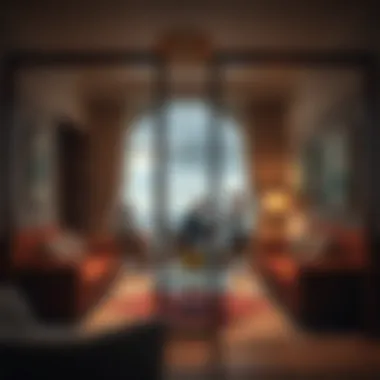

- Property maintenance: Beyond ensuring rooms are structurally safe, landlords must cater to essential utilities like water and electricity, complying with health and safety standards.
- Transparency with tenants: Landlords should provide all relevant information regarding lease terms and any changes that arise in the property landscape.
- Handling complaints effectively: If a tenant raises an issue, landlords are required to resolve it in a timely fashion.
Understanding these obligations is critical for landlords as failing to meet them can result in legal issues and a tarnished reputation in the local community.
According to the a.b.c. regulations provided by the Dubai Land Department, a smooth landlord-tenant relationship is beneficial for maintaining property value and reducing vacancy rates.
In sum, the legal aspects of partition rooms are intricate yet essential for both residents and property owners alike. Awareness of the regulatory framework, tenant rights, and landlord obligations can foster a stable and thriving housing environment in Deira.
Future Trends in Partition Rooms
Understanding the future trends that shape the partition rooms in Deira is critical for investors and residents alike. As urban landscapes evolve and living arrangements diversify, discerning these trends helps in making informed decisions in a crowded property market. These insights not only benefit current residents but also signal potential pathways for future development.
Evolving Market Demands
The demand for partition rooms is evolving, adapting to the changing preferences of diverse demographics. With a growing population that includes professionals, students, and expatriates, there's a notable shift towards affordable yet comfortable living spaces. Investors are increasingly recognizing this need, leading to the emergence of properties that cater to a wider range of tenants.
In Deira, the traditional view of partition rooms is shifting. People no longer see them merely as budget options; they’re becoming a lifestyle choice embraced by younger generations seeking community and convenience. More than just a roof over one's head, these spaces now often come equipped with modern amenities that appeal to tech-savvy tenants.
Factors influencing these evolving demands include:
- Affordability: Rising costs in urban areas prompt seekers to look towards shared living arrangements.
- Community Living: Many residents appreciate the social aspect of sharing spaces, particularly in an increasingly isolated world.
- Reconfiguration of Spaces: Landlords are innovating to create multifunctional spaces that meet various needs.
Given these shifting demands, savvy investors might find opportunities for new developments or remodels that align with this trend.
Sustainability and Innovation
Sustainability is no longer an afterthought; it has become a vital consideration in developing partition rooms. An increasing number of tenants prioritize eco-friendly living, driving developers to incorporate green technologies into their properties.
In Deira, you might find:
- Energy-efficient appliances: As more renters look to minimize their impact, properties that promote sustainability with energy-efficient devices have a competitive edge.
- Waste Management Systems: Shared living arrangements now often include organized waste segregation and recycling initiatives.
- Smart Living Solutions: Innovations such as energy consumption monitoring systems appeal to both budget-conscious tenants and environmentally aware individuals.
By integrating sustainability into the design and functionality of partition rooms, developers can not only attract eco-conscious residents but also capitalize on long-term cost savings associated with energy efficiency.
Impacts of Urban Development
Urban development in Deira is tightly linked to the future of partition rooms. As city planners focus on revitalizing urban areas, their decisions influence housing availability and accessibility.
The growing trend of mixed-use developments combining residential, commercial, and recreational spaces presents new opportunities for partition room living. Such developments can enhance the quality of life by providing easy access to work, shopping, and leisure—all in one location.
The impacts of urban development on partition rooms include:
- Increased Property Values: As the neighborhood improves, so too does the appeal of partition rooms, leading to potential rental increases.
- Infrastructure Enhancements: Better public transport and community services make these living arrangements more desirable.
- Cultural Integration: New developments attract a diverse range of people, enriching the community fabric and offering a dynamic environment for residents.
Epilogue
As we draw the curtain on our inquiry into partition rooms in Deira, it becomes evident that these unique living spaces offer much more than just a roof overhead. They encapsulate a myriad of societal dynamics and serve as an entry point to understanding the broader real estate ecosystem in this bustling region of Dubai.
Recap of Key Points
Firstly, the geographical context of Deira stands as a vibrant backdrop to the evolving landscape of housing options. Its historical significance cannot be overstated, as it acts as a witness to Dubai's rapid growth and transformation. Moreover, the cultural diversity of its residents plays a crucial role in how partition rooms are perceived and utilized.
Next, residents often must navigate a complex legal framework which governs tenant rights and landlord obligations. This can be overwhelming for newcomers but is vital to ensuring a fair living environment. Additionally, understanding market dynamics helps potential investors gauge the demand and supply factors, leading to informed decisions when engaging in this segment of the real estate market.
Furthermore, the lifestyle associated with living in a partition room deserves attention. Residents may face challenges, including limited privacy and the need for adaptation in communal settings, but these aspects also foster a unique sense of community.
Final Thoughts on Investment Opportunities
In light of the insights gathered, it becomes apparent that investing in partition rooms presents a unique opportunity. As urban development continues to thrive in Deira, the potential for growth in this market segment becomes increasingly clear. While challenges exist, such as fluctuating pricing trends and regulatory complexities, the overall investment landscape remains promising. For investors, the key lies in balancing risks with the rich tapestry of benefits, including affordable housing options and a continually evolving urban environment.



